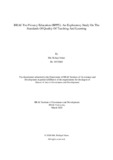BRAC Pre-Primary Education (BPPE): an exploratory study on the standards of quality of teaching and learning

View/Open
Date
2020-02Publisher
Brac UniversityAuthor
Islam, Md. RafiqulMetadata
Show full item recordAbstract
The study titled BRAC Pre-primary Education (BPPE) : An Exploratory Study on The
Standards of Quality Teaching and Learning has been conducted by Md. Rafiqul Islam for
investigating the standards of quality learning environment of PPE at BRAC schools and
identifying the challenges to meet the standards of quality learning environment for preprimary
classes at BRAC schools. By using qualitative approach the study has explored the
major factors of quality learning environment referring to Accessibility of the School
Environment and Participation, Classroom Activities, Classroom Management and Practice,
Teaching Learning Materials/Aids, Communication and Interaction, Performance Assessment
of Children, Leadership and Team Work Practices at School. Accessibility of the School
Environment. 30 children of 5-6 years old including minimum two kids with special needs
have the accessibility to BPPS. Instead of retention the dropped out child, another one is
replaced from the school community. Lack of interest, good communication creates negative
effect on access to BPPS.. Classroom Activities including co-curricular events arranged
inside and outside the school through multiple ways of teaching and learning are found very
good. Good classroom has been ensured through time maintenance, monitoring, supervision
implementing lesson plan and class routine. Through classroom observation classroom
management has been found very well. Maximum teaching-learning materials provided by
BRAC, some collected from outside are used in various ways. For further improvement
school dress and mid-meal are needed . Inter and intra personal communication among
students and other stakeholders are good. teacher-parents association, community gathering,
and awarding best parents are suggested for better communication. Children Assessments are conducted through Formative and summative ways. Everyday
Attendance, playing performance and cultural activities are suggested to add in the final
evaluation of the children. Through Lesson Plans, Outdoor tour, various plays and games,
verbal and written communication are practiced for Leadership Development and Team
Work. The study has found that the maximum parameters of learning environment are very
good, some are good and very few are at fair level. Almost all respondents have faced the
challenges to enrol the students; ensure the presence at class, stop the drop-out, and conduct
the teaching-learning activities from their side respectively. The areas which have been found
good and fair need to be improved through institutional development.
